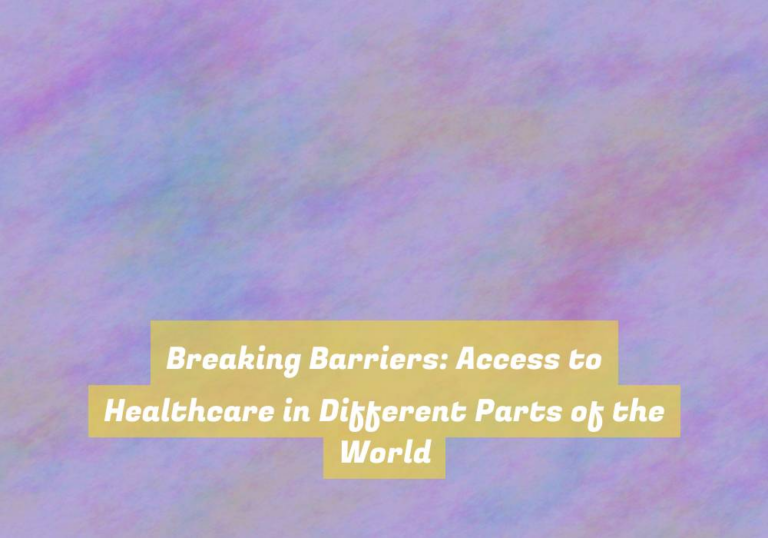From Universal Coverage to Specialized Care: Understanding Healthcare Models Globally
As you navigate the complex landscape of healthcare systems around the world, you encounter a spectrum of approaches from universal coverage to specialized care.
Each model brings its own set of advantages and challenges, shaping the way healthcare is delivered and accessed.
You may find yourself pondering the impact of these diverse models on the quality and equity of care, as well as their implications for the sustainability of healthcare systems.
But how do these models truly differ, and what can we learn from their successes and shortcomings?
Universal Healthcare Systems
Understanding Universal Healthcare Systems requires examining the various approaches used by different countries to provide healthcare coverage for all citizens.
In Canada, for example, healthcare is publicly funded and available to all residents. The government pays for the majority of healthcare services, and citizens have access to medical treatment without worrying about financial barriers.
Similarly, the United KingdomG??s National Health Service (NHS) provides comprehensive healthcare to all residents, funded through taxation. Citizens can access a wide range of medical services, including doctorG??s appointments, hospital care, and prescription medications, without having to pay out-of-pocket fees.
In contrast, some countries, like Germany, have a social health insurance system where citizens contribute to healthcare through insurance premiums. This system allows for a choice of insurance providers but still ensures that everyone has access to necessary medical care.
Specialized Care Models
Specialized care models encompass a range of healthcare approaches tailored to specific medical conditions or patient needs. These models are designed to provide focused and expert care for individuals with complex or rare medical conditions, such as cancer, heart disease, or neurological disorders.
One example of a specialized care model is the multidisciplinary approach, which involves a team of healthcare professionals from various specialties working together to develop comprehensive treatment plans for patients.
Another model is the disease-specific care model, which centers on delivering specialized care for a particular illness or condition, such as diabetes or HIV/AIDS.
Additionally, there are specialized care models that cater to specific populations, such as pediatric or geriatric care models, which address the unique healthcare needs of children or older adults.
These models often integrate advanced technology, specialized training, and research-based practices to ensure the best possible outcomes for patients with complex or specialized healthcare needs.
Understanding the nuances of specialized care models is crucial for healthcare professionals and policymakers to ensure that all patients receive high-quality, tailored care that meets their specific medical requirements.
Funding and Sustainability
To ensure the continuity and effectiveness of specialized care models, securing adequate funding and establishing sustainable practices is essential.
Funding for specialized care can come from a variety of sources, including government allocations, private insurance, donations, and grants. ItG??s crucial to ensure that funding is both reliable and sufficient to support the ongoing needs of specialized care facilities, equipment, and staff.
Developing sustainable practices involves careful resource management, cost-effective strategies, and ongoing evaluation of the quality and efficiency of care provided. It also requires adapting to changes in the healthcare landscape, such as advancements in medical technology and shifts in patient demographics. Sustainable practices help to ensure that specialized care models can continue to meet the needs of patients now and in the future.
Additionally, incorporating preventive care measures and promoting public health initiatives can contribute to long-term sustainability by reducing the burden of chronic diseases and improving overall community well-being.
Impact on Population Health
Securing adequate funding and establishing sustainable practices for specialized care models not only ensures their continuity and effectiveness but also has a direct impact on the overall health of the population they serve.
By focusing on specific health needs, specialized care models can improve population health outcomes in several ways. These models often lead to earlier detection and intervention for certain conditions, ultimately reducing the prevalence of advanced diseases and improving overall health.
Additionally, specialized care can enhance the coordination of services, leading to more efficient and effective care delivery for patients with complex or chronic conditions.
Moreover, by targeting specific health concerns, specialized care models can contribute to preventive efforts, reducing the overall disease burden within the population.
Furthermore, these models can also lead to advancements in medical research and innovation, which can benefit not only the patients directly receiving specialized care but also the broader population through the development of new treatments and technologies.
Therefore, investing in and promoting specialized care models can have a significant positive impact on the health and well-being of the population.
Conclusion
In conclusion, understanding different healthcare models globally is crucial for providing quality care to diverse populations. From universal coverage to specialized care, each model has its strengths and challenges.
By examining funding, sustainability, and impact on population health, healthcare systems can adapt and improve to meet the evolving needs of their communities.
ItG??s essential to continue learning and sharing best practices to ensure equitable access to healthcare for all.







